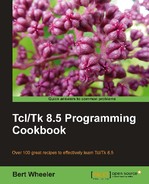Filtering a dictionary in Tcl allows us to create a new dictionary containing the filtered key/value pairs, as opposed to simply returning a filtered listing. This allows us to isolate the data desired and interact with it dynamically. To accomplish this, Tcl provides the dict filter command. The syntax is as follows:
dict filter dictionaryValue filter_type argument1 argument2 …
Various filter types are supported by the command. The filters are as follows:
|
Option |
Interpretation |
|---|---|
|
Key |
The key rule matches the key/value pair whose keys match the defined pattern, as in a string match. |
|
Value |
The value rule matches the key/value pairs whose value matches the defined pattern, as in a string match. |
|
Script |
The script rule tests for matching by assigning the key to a key variable and the value to a value variable, and then evaluating the given script, which must return a Boolean value. Only those sets that return the value If the script returns a In the event of a |
In the following example we will create a dictionary containing a set of key/value pairs and then filter to determine if a specific key exists. Return values from the commands are provided for clarity. Enter the following command:
% set names [dict create 1 John 2 Mary 3 Paul]
1 John 2 Mary 3 Paul
% set filtered [dict filter $names key 1]
1 John
The dict filter command accepts a named dictionary as referenced by dictionaryValue and returns a new dictionary containing the key/value pairs that match the filtering criteria as defined in the argument or arguments provided.
In the following example, we will create a dictionary containing a set of key/value pairs and then filter to determine if a specific value exists. Return values from the commands are provided for clarity. Enter the following command:
% set names [dict create 1 John 2 Joe 3 Paul]
1 John 2 Joe 3 Paul
% set filtered [dict filter $names value Jo*]
1 John 2 Joe
As you can see, the dict filter command accepted the arguments and based on the existence of the value to be filtered, it has returned a new dictionary named filtered, containing the located key/value pairs.
In the following example, we will create a dictionary containing a set of key/value pairs and then filter to determine if a specific value exists, by using the script keyword. Return values from the commands are provided for clarity. Enter the following command:
% set filtered [dict filter $name script {key value} {
Expr {$key < 2}
}]
1 John
In this instance, the filter command has evaluated each key/value pair and returned those that evaluate as true, in the provided script.
